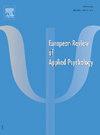关系状况与心理健康问题的关联:对依恋和注意力的研究
IF 1.4
4区 心理学
Q3 PSYCHOLOGY, APPLIED
European Review of Applied Psychology-Revue Europeenne De Psychologie Appliquee
Pub Date : 2024-11-01
DOI:10.1016/j.erap.2024.101045
引用次数: 0
摘要
方法研究 1 是一项在线研究,研究对象是已婚(125 人)或单身(125 人)的同等群体;研究 2 是一项概率实验室研究,研究对象是单身(21 人)或恋爱(89 人)的两个自然群体。结果路径分析显示,依恋回避和注意力控制可以作为中介,解释关系状态在心理健康问题中的作用。结论我们的研究表明,恋爱或已婚与心理健康的改善有关,婚姻和夫妻生活对心理健康的益处可以通过依恋和注意力来解释。本文章由计算机程序翻译,如有差异,请以英文原文为准。
Relationship status-mental health concerns association: An examination of attachment and attention
Introduction
Past studies have revealed an advantage of marriage over singlehood, but the role of relationship status in mental health concerns needs further investigation.
Objective
This paper examined the connection between relationship status and mental health concerns and explored the cognitive and affective mechanisms explaining it, using a multi-method approach.
Method
Study 1 was an online study with equal groups of married (n = 125) or single individuals (n = 125), whereas Study 2 was a probabilistic laboratory study with two natural groups of individuals that were either single (n = 21) or in a relationship (n = 89).
Results
Path analyses showed that attachment avoidance and attentional control could act as mediators explaining the role of relationship status in mental health concerns.
Conclusion
We showed that being in a relationship or being married was associated with better mental health and that the benefits of marriage and couple life on mental health were explained by attachment and attention.
求助全文
通过发布文献求助,成功后即可免费获取论文全文。
去求助
来源期刊

European Review of Applied Psychology-Revue Europeenne De Psychologie Appliquee
PSYCHOLOGY, APPLIED-
CiteScore
2.20
自引率
20.00%
发文量
38
期刊介绍:
The aim of the Revue européenne de Psychologie appliquée / European Review of Applied Psychology is to promote high-quality applications of psychology to all areas of specialization, and to foster exchange among researchers and professionals. Its policy is to attract a wide range of contributions, including empirical research, overviews of target issues, case studies, descriptions of instruments for research and diagnosis, and theoretical work related to applied psychology. In all cases, authors will refer to published and verificable facts, whether established in the study being reported or in earlier publications.
 求助内容:
求助内容: 应助结果提醒方式:
应助结果提醒方式:


